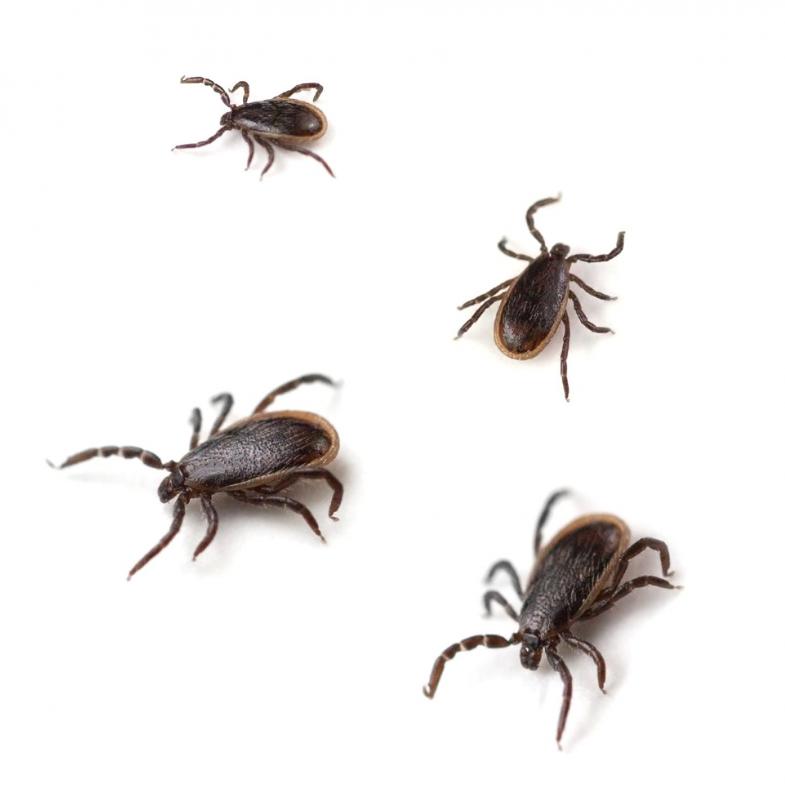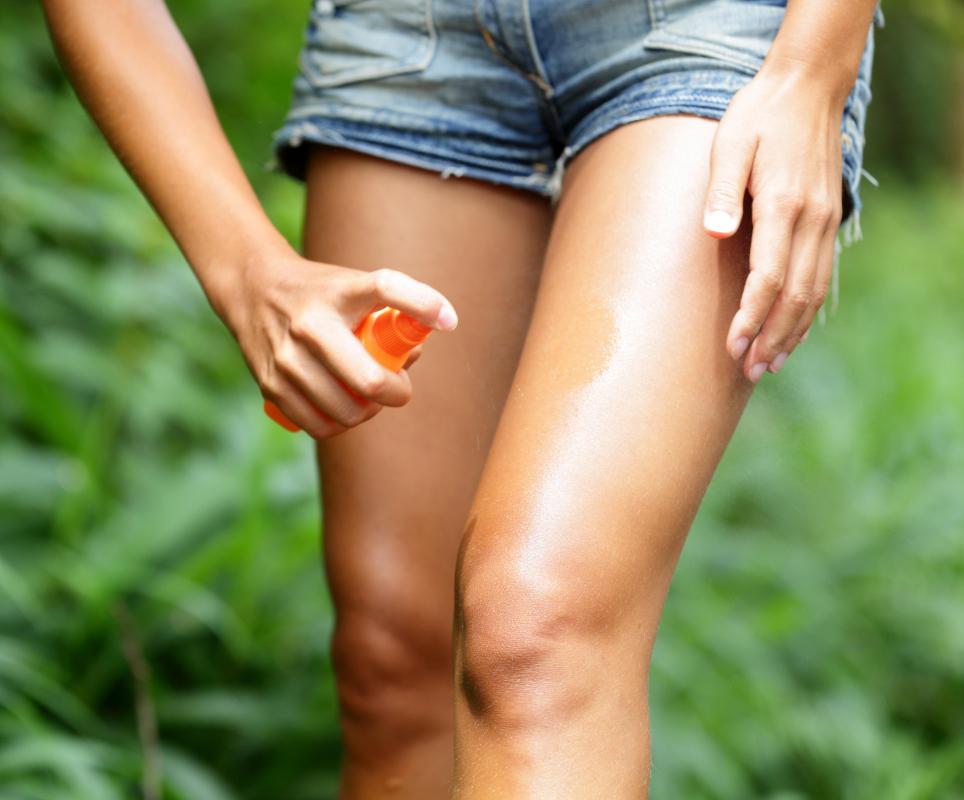At TheHealthBoard, we're committed to delivering accurate, trustworthy information. Our expert-authored content is rigorously fact-checked and sourced from credible authorities. Discover how we uphold the highest standards in providing you with reliable knowledge.
What is DEET?
DEET is a popular type of liquid insect repellent that is used primarily to ward off mosquitoes and ticks. It is most commonly sold as a spray, but sometimes also comes as a loose liquid or on a moistened wipe. Different concentrations are available in different places, and manufacturers sometimes include other ingredients and repellents, too. How effective it is depends in part on the concentration but also on individual body chemistry. It works primarily by giving off a smell that masks the scent of carbon dioxide produced by humans. The scent is also usually thought to be unpleasant to insects, which causes them to stay away from treated skin; in turn, this can save people from being bitten — and, importantly, can reduce the risk of contracting an insect-borne illness. This type of repellent is widely recommended by health experts, but it does come with some risks. It can be dangerous to inhale, for instance, and people with sensitive skin sometimes experience rashes or other breakouts. In general, though, it is considered safe, at least for occasional use.
Why It’s Used

People use this repellent in order to prevent insect bites. Most bites cause itchy red swells on the skin, which can be very uncomfortable. Perhaps more importantly, though, is the issue of disease prevention. A great many illnesses and serious diseases are carried by insects, and people get infected from bites and stings. Using a repellent to keep bugs away is often one of the easiest ways to stay comfortable and healthy.

This particular repellent is usually seen as one of the most effective, but it’s also one of the harshest. Unless people live or work in constantly insect-infested places, it is usually something that’s used only sparingly. People bring it on vacation with them, for instance, or use it on summer nights in swampy places. It can be used for constant, round-the-clock insect protection, though it isn’t always recommended for such regular use.
How it Works

DEET gets its name from its chemical makeup. The compound is known scientifically as diethyltoluamide, or more formally N,N-diethyl-meta-toluamide. It works to confuse the scent receptors in most biting insects’ brains, which causes them to bypass people wearing it.
Biting insects typically follow the scent of carbon dioxide gas to find a meal. Human skin naturally gives off some carbon dioxide, and people also exhale this gas with every breath. This is one of the main ways insects find people to bite in the first place. Putting a small amount of this repellent on exposed skin or around the cuffs and collars of clothing can throw insects off the scent. In addition, the smell of the repellent is generally off-putting to insects, which can also help keep them away.
Special Considerations for Disease Prevention

This repellent was first developed by the U.S. military during World War II as a way to help lessen the risk ground troops in the Pacific faced from malaria and other insect-borne illnesses. It is still very important in this fight today; according to most experts, its greatest benefit is in repelling disease-bearing insects, like deer ticks that can transmit Lyme disease and mosquitoes that can transmit malaria, encephalitis, and West Nile virus. It also benefits those exposed to insects that might be carrying dengue fever and other diseases.
Risks and Common Warnings

Most government health agencies have approved the safety of the active ingredients in this repellent, and it’s widely available for sale in most parts of the world. There are varying concentrations in most places, which perhaps primarily speaks to efficacy — but also impacts safety. Concentrations nearing 100% are often very harsh, and can sometimes irritate the skin or leave chemical burns, particularly in those with sensitive skin. Very low concentrations might not be as effective, though, and usually have to be reapplied more regularly.
Most scholars say that concentrations of about 20% will successfully repel mosquitoes for about 5 hours — which is nearly three times longer than most other competing products. Other studies have found that ticks are repelled for anywhere from 3-8 hours, depending on the concentration used.
People should usually exercise caution when using this product on children, particularly babies and infants. In general it should not be ingested, and swallowing it can lead to digestive upset and stomach problems. Some studies have suggested that people who breathe DEET in on a regular basis, either because they or others close to them spray it regularly or, more commonly, because they work in facilities where it is processed or tested, are more at risk for developing lung and other respiratory problems. These studies have not been widely repeated or proved, but people are nevertheless encouraged to use the product only in well-ventilated areas and to keep it out of the reach of children. In case of ingestion or inhalation, it’s usually best to contact a health care provider for advice.
AS FEATURED ON:
AS FEATURED ON:















Discussion Comments
Is there any natural stuff I can use as mosquito repellent?
We are the guinea pigs. We find out years later that a product deemed safe is not.
@ukwong: I totally agree with you. There have been recent studies done as to the dangers of DEET. After frequent and prolonged use, brain cell death and behavioral changes in rats was found. In turn, neurons die in regions of the brain that control the muscle movement.
In humans, overexposure can lead to memory loss, headaches, fatigue, muscle pain, and shortness of breath. That is consistent with findings that were reported following the military’s use of DEET in the Gulf War.
In a nutshell, it is a good idea to only use DEET in small quantities, especially in children.
I personally think even this product is proven effective to repel mosquito and other insects but if use for long term, i believe its will bring side effect to our health because this is still chemical product, so i believe many people is prefer something natural to prevent mosquitoes.
Post your comments